”When you chop the head off the chickens, you should not smile, for then one can get the blood and feathers in the mouth.” Tara is sitting on the lesson in art history, and reflects on Caravaggio's barockmålning ”Judith beheads Holofernes”. She thinks of how she keeps in the birds, scabby legs while dad raises the axe, and notes that the painting is fake news – no one looks like that untouched out at a beheading. A little later she asks the teacher what ”Holocaust” means.
”All I had to learn” is the us because of Tara Westovers, to say the least spectacular depiction of the way from an isolated mormontillvaro on a mountain in Idaho to study at elite universities such as Cambridge and Harvard. Forget, by the way, all the mormons you encountered through pop culture phenomenon that is ”Big love” and ”Book of mormon” – polygamy and outreaches weighs infinitely easy in this context. The home of the family Westover is explosive and uncompromising, the madness of the concrete anticipation of the day of judgment.
Dad has a tank with four thousand liters of gasoline buried in the yard. Mother walks around and amatörförlöser women which cracks and bleeds and gives birth to underweight children. The younger siblings have no birth certificates, and have never had contact with the care or authorities. And, above all, so they don't go to school. Then you might as well ”leave the cubs directly to the devil,” says father Gene and occurs constantly to a kind of primeval story about the violent siege of a neighbouring house, where the government wanted to force the children out to the wicked teaching. Far later Tara know that they where the events in fact, it was about arms trafficking with connections to the white power movement.
if hemskolning, but the kids driving around at most of the family junkyard as a hot game for the forces that can crush and mutilate a soft human body. The head of the family is literally prepared to throw their children into the jaws of death, and explains with a kind of win-win reasoning that the almighty watches over them – and then, if a finger is torn off, it is still the will of God.
It is this forgiving tone that opens an abyss of icy seriousness as the older Tara suddenly understand the meaning of the strongly anti-semitic conspiracy theories, the father indulged in all the years
So had ”All I had to learn” have been able to become a pure misärskildring, with the not entirely unusual logic that suffering, by definition, create urgent art. But this is not a classic cliché överlevarprosa, but if you are a writer in depth actually want to understand what she has been through.
Westover writes so beautifully about the superior feeling of staying on a mountain, an experience which more than any other influenced the father is the head of the hard core: ”In the vastness of space, you can sail up for itself in hours, float around on a sea of pine trees and bushes and rocks. There is a peace springing from ofantligheten; it soothes by their very magnitude, that makes everything human seem insignificant. Gene was shaped by this alpine hypnosis, this silencing of the human drama.”
the humor in the portrayal of the father's longing for millenniebuggens fiery chaos, and the dark depression that follows when the sun comes up as usual on the first of January. And it is this forgiving tone that opens an abyss of icy seriousness as the older Tara suddenly understand the meaning of the strongly anti-semitic conspiracy theories, he devoted himself to all these years. So provides, ”All I had to learn ' is also a stratification in the image of the fragmented united states, where the impoverished countryside, so often set against the urban middle class and the common people against the establishment.
Dad Westover of the group to which the routine is usually called for Trumpväljare, when he himself would probably regard the president as the devil's socialist minions. And when the family may spin on its quackery sells the diluted homeopatvatten and essential oils for million; this is no vulnerable losers in the wake of globalization. Of the seven children in the family to Westover, there are four with no high school diploma and three with a phd.
the Context may be exceptional, but bear still traces of the traditional klassresans conflicts between the stops and the one that goes: ”My contact with the education system had made me stuck, and what I needed was to be dragged through the time. Fixed, anchored in an older version of myself.” The depiction of the author's labile big brother and his outright assassination attempt on the ”whore” who want to study the guess closest to the form of your own thriller.
in the home is such that it is actually possible to escape, to brytningens high price. And the road from the junkyard to Harvard, who go through the Swedish scholastic aptitude test and a mormonskt university receiving the ”homeschooled” students, is undeniably sensational – actually to the point that the book is weakened somewhat in tandem with the success story. Suddenly sees the young student symmetries everywhere, and all she can learn also melts together with the own liberation, in a timely manner. Negative and positive freedom? Now wait, that sounds like my life.
the Contrast will be great against the book's first part, which sweeps over the reader with violent force and magical allure. I think the key is that Westover does not fall into the trap of selling out his – frankly completely deranged – past, but only tells us about the extreme the origin with osentimental and cocky remotely.
Maybe that is why the straight and nuanced barndomsskildringen is so very convincing. She allowed me even to begin to question what a man really needs to learn – is studies in the history of art, by definition, more important to a child than to be able to slaughter a chicken? Yes, the who want to live in a civilization, I think it is. But the point is that there is a peculiar transparency of the Westovers författarblick, and that it actually makes me falter.

 New York: at Columbia University, the anti-Semitic drift of pro-Palestinian demonstrations
New York: at Columbia University, the anti-Semitic drift of pro-Palestinian demonstrations What is Akila, the mission in which the Charles de Gaulle is participating under NATO command?
What is Akila, the mission in which the Charles de Gaulle is participating under NATO command? Lawyer, banker, teacher: who are the 12 members of the jury in Donald Trump's trial?
Lawyer, banker, teacher: who are the 12 members of the jury in Donald Trump's trial? After 13 years of mission and seven successive leaders, the UN at an impasse in Libya
After 13 years of mission and seven successive leaders, the UN at an impasse in Libya What High Blood Pressure Does to Your Body (And Why It Should Be Treated)
What High Blood Pressure Does to Your Body (And Why It Should Be Treated) Vaccination in France has progressed in 2023, rejoices Public Health France
Vaccination in France has progressed in 2023, rejoices Public Health France Food additives suspected of promoting cardiovascular diseases
Food additives suspected of promoting cardiovascular diseases “Even morphine doesn’t work”: Léane, 17, victim of the adverse effects of an antibiotic
“Even morphine doesn’t work”: Léane, 17, victim of the adverse effects of an antibiotic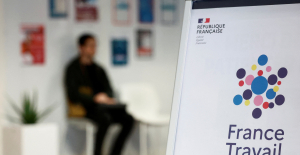 Unemployment insurance: tightening of the rules on July 1
Unemployment insurance: tightening of the rules on July 1 Cancers, chronic diseases... Billions of workers hit by climate change, warns the UN
Cancers, chronic diseases... Billions of workers hit by climate change, warns the UN Closure of the A13 extended until at least mid-week
Closure of the A13 extended until at least mid-week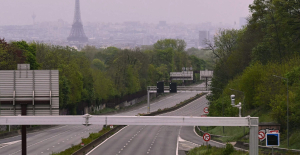 Closure of the A13: Pécresse “asks the State to take charge of making the A14 free”
Closure of the A13: Pécresse “asks the State to take charge of making the A14 free”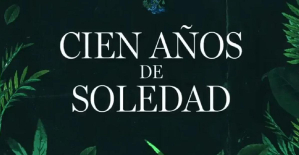 The series adaptation of One Hundred Years of Solitude promises to be faithful to the novel by Gabriel Garcia Marquez
The series adaptation of One Hundred Years of Solitude promises to be faithful to the novel by Gabriel Garcia Marquez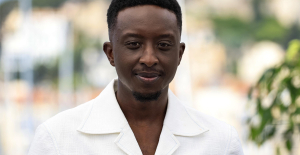 Racism in France: comedian Ahmed Sylla apologizes for “having minimized this problem”
Racism in France: comedian Ahmed Sylla apologizes for “having minimized this problem” Mohammad Rasoulof and Michel Hazanavicius in competition at the Cannes Film Festival
Mohammad Rasoulof and Michel Hazanavicius in competition at the Cannes Film Festival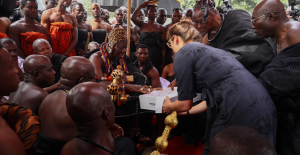 UK lends Ghana treasures stolen during colonization
UK lends Ghana treasures stolen during colonization Skoda Kodiaq 2024: a 'beast' plug-in hybrid SUV
Skoda Kodiaq 2024: a 'beast' plug-in hybrid SUV Tesla launches a new Model Y with 600 km of autonomy at a "more accessible price"
Tesla launches a new Model Y with 600 km of autonomy at a "more accessible price" The 10 best-selling cars in March 2024 in Spain: sales fall due to Easter
The 10 best-selling cars in March 2024 in Spain: sales fall due to Easter A private jet company buys more than 100 flying cars
A private jet company buys more than 100 flying cars This is how housing prices have changed in Spain in the last decade
This is how housing prices have changed in Spain in the last decade The home mortgage firm drops 10% in January and interest soars to 3.46%
The home mortgage firm drops 10% in January and interest soars to 3.46% The jewel of the Rocío de Nagüeles urbanization: a dream villa in Marbella
The jewel of the Rocío de Nagüeles urbanization: a dream villa in Marbella Rental prices grow by 7.3% in February: where does it go up and where does it go down?
Rental prices grow by 7.3% in February: where does it go up and where does it go down? Europeans: “All those who claim that we don’t need Europe are liars”, criticizes Bayrou
Europeans: “All those who claim that we don’t need Europe are liars”, criticizes Bayrou With the promise of a “real burst of authority”, Gabriel Attal provokes the ire of the opposition
With the promise of a “real burst of authority”, Gabriel Attal provokes the ire of the opposition Europeans: the schedule of debates to follow between now and June 9
Europeans: the schedule of debates to follow between now and June 9 Europeans: “In France, there is a left and there is a right,” assures Bellamy
Europeans: “In France, there is a left and there is a right,” assures Bellamy These French cities that will boycott the World Cup in Qatar
These French cities that will boycott the World Cup in Qatar Basketball (F): big winner of Asvel, Basket Landes will face Tarbes in the semi-final of the League
Basketball (F): big winner of Asvel, Basket Landes will face Tarbes in the semi-final of the League Football: Yazici (Lille) “in shock” after an attempted theft at his home
Football: Yazici (Lille) “in shock” after an attempted theft at his home Serie A: victorious over AC Milan, Inter crowned Italian champions for the 20th time
Serie A: victorious over AC Milan, Inter crowned Italian champions for the 20th time Serie A: “Winning a title in a derby has never happened,” relishes Martinez after Inter’s coronation
Serie A: “Winning a title in a derby has never happened,” relishes Martinez after Inter’s coronation


















